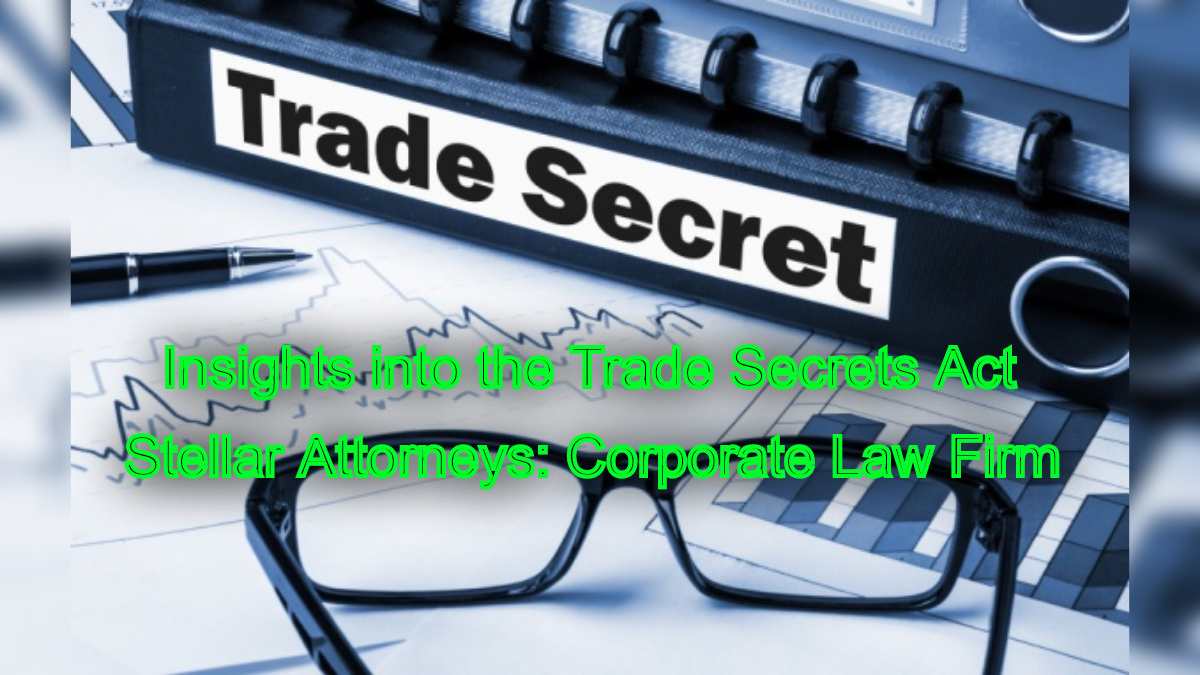Protecting Trade Secrets: Trade secrets are valuable business assets that can provide a competitive advantage. Protecting trade secrets is crucial for businesses of all sizes. The Trade Secrets Act, enacted in 2016, provides a legal framework for protecting trade secrets in the United States. In this article, we will explore the key provisions of the Trade Secrets Act and discuss the role of legal professionals in protecting trade secrets.
Protecting Trade Secrets: Insights into the Trade Secrets Act: Stellar Attorneys
Understanding Trade Secrets
Trade secrets are confidential information that has economic value due to its secrecy and that has been reasonably protected from unauthorized disclosure. Examples of trade secrets include:
- Formulas: Proprietary formulas used in manufacturing processes.
- Customer Lists: Confidential lists of customers and their preferences.
- Business Plans: Strategic plans and financial information.
- Software Source Code: The underlying code of software programs.
- Marketing Strategies: Proprietary marketing techniques and strategies.
Key Provisions of the Trade Secrets Act
The Trade Secrets Act provides several remedies for the misappropriation of trade secrets. These include:
- Injunctive Relief: The court may order the defendant to stop using or disclosing the trade secret.
- Monetary Damages: The plaintiff may be entitled to monetary damages, including lost profits and unjust enrichment.
- Attorney’s Fees: The court may award attorney’s fees to the prevailing party.
The Role of Legal Professionals
Legal professionals play a crucial role in protecting trade secrets. They can help businesses:
- Identify Trade Secrets: Identify and classify information that constitutes trade secrets.
- Implement Protective Measures: Develop and implement measures to protect trade secrets, such as confidentiality agreements, physical security, and access controls.
- Investigate Misappropriation: Investigate suspected cases of trade secret misappropriation.
- Litigate Cases: Represent clients in lawsuits involving trade secret disputes.
- Provide Preventive Advice: Offer guidance on how to prevent trade secret misappropriation.
Stellar Attorneys: Your Trusted Legal Partner
Stellar Attorneys is a leading corporate law firm specializing in trade secret protection. Our team of experienced attorneys has a proven track record of successfully representing clients in trade secret disputes.
Why Choose Stellar Attorneys?
- Expertise: Our attorneys have in-depth knowledge of trade secret law and best practices.
- Personalized Approach: We tailor our services to meet the specific needs of each client.
- Proactive Advice: We provide proactive guidance to help clients prevent trade secret misappropriation.
- Strong Track Record: We have a proven track record of successfully representing clients in trade secret disputes.
- Cost-Effective Solutions: We strive to provide cost-effective solutions for our clients.
FAQs
A patent protects an invention, while a trade secret protects confidential information.
Companies can protect their trade secrets by implementing measures such as confidentiality agreements, physical security, and access controls.
The remedies for trade secret misappropriation include injunctive relief, monetary damages, and attorney’s fees.
Yes, a company can sue a former employee for misappropriating trade secrets if the employee breached a confidentiality agreement or violated their fiduciary duty.
Stellar Attorneys can provide expert legal advice, representation, and training on trade secret protection.
Conclusion
Protecting trade secrets is essential for businesses of all sizes. By working with a reputable law firm like Stellar Attorneys, you can ensure that your valuable business assets are safeguarded. Our team of experienced attorneys is dedicated to providing the highest quality legal services and helping clients achieve their business goals.
Read More
- Resolving Shareholder Disputes: Navigating the Shareholder Agreements Act
- Facilitating Foreign Investments: Expertise in the Foreign Exchange Management Act (FEMA)
- Ensuring Data Protection: Understanding the Information Technology Act
- Navigating Employment Laws: Insights into the Employment Contracts Act
- Safeguarding Consumer Interests: Expertise in the Consumer Protection Act
- Controller General of Patents, Designs & Trademarks (CGPDTM)

![Stellar Attorneys: Corporate Law Firm [Business Lawyers, Company Attorneys and Criminal Advocates]](https://lawyers.org.in/wp-content/uploads/2023/08/cropped-Stellar-Attorneys.png)
